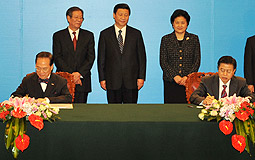 |
| Close partnership: Chief Executive Donald Tsang and Guangdong Governor Huang Huahua sign the Framework Agreement on Hong Kong-Guangdong Co-operation. |



|
Guangdong and Hong Kong have signed the framework agreement on Hong Kong-Guangdong co-operation, bringing the two jurisidictions' co-operation to new heights.
Witnessed by State Vice-President Xi Jinping and other state leaders, Chief Executive Donald Tsang and Guangdong Governor Huang Huahua signed the document in the Great Hall of the People in Beijing this morning.
The agreement sets clear targets and development positioning for Hong Kong/Guangdong co-operation, and outlines specific polices and measures, including:
* to promote joint socio-economic development in Hong Kong and Guangdong to create a new world-class economic zone;
* to enhance Hong Kong's position as an international financial centre and expedite the development of financial-services industries in Guangdong to build an international financial centre with Hong Kong;
* to capitalise on the competitiveness of Hong Kong's service industries and Guangdong's manufacturing industries to build an advanced global manufacturing and modern services base;
* to facilitate the flow of key factors such as people, goods, information and capital across the boundary, with a view to building an international aviation, shipping and logistics hub and a world-class modern economic circulation sphere;
* to implement a regional ecology and environment protection regime operating at a leading level by the national standards to create a high quality living area; and
* to promote collaborative development among Hong Kong and the Pearl River Delta cities to form a world-class metropolis cluster.
Specific policies, initiatives
To achieve the objectives, Hong Kong and Guangdong have put forward specific policies and measures, and set out major initiatives for 2010.
Major tasks relating to financial-services development include exploring specific arrangements for bank financing and issuance of renminbi bonds in Hong Kong by Guangdong enterprises, advancing the renminbi cross-border trade-settlement pilot scheme, and encouraging more Guangdong enterprises to list in Hong Kong.
To support the manufacturing and services sectors, the two places will help Hong Kong-owned processing enterprises to upgrade and restructure.
In 2010, both places will continue to work out measures that will facilitate the business operation of Hong Kong-invested enterprises to tap into the Mainland market, and deal with problems encountered in the implementation of the Closer Economic Partnership Arrangement and pilot measures in Guangdong.
The two places will promote mutual legal co-operation and strengthen ties and communication with Guangdong authorities and legal bodies.
Cross-boundary infrastructure
To facilitate the flow of people, goods, information and capital, the two Governments will expedite the construction of cross-boundary highways, rail links and ancillary works, build a high class navigation network in the delta, improve the mechanism of the joint meeting of the five major airports in the delta, seek national support for enlarging the air space in the delta, support the respective aviation status of each airport, build a network of short-haul helicopter services, support Hong Kong as an international maritime centre, and support the development of an international logistics hub.
In 2010, both places will pursue the implementation of the Hong Kong-Zhuhai-Macau Bridge project in a timely manner, continue the planning of the Hong Kong-Shenzhen Western Express Line, and press ahead with the construction of the Hong Kong section of the Guangzhou-Shenzhen-Hong Kong Express Rail Link and strive to complete it by 2015.
Environmental and ecological protection policies include jointly exploring the reduction targets and options for total air pollutants emission in the delta region in 2011-2020.
In 2010, both places will strive to complete the 2011-2020 objectives of the delta's regional air quality management plans by 2010, strengthen the co-operative efforts in studying the relationship among photochemical smog, hazy weather and atmospheric quality, and improve the delta's regional air quality monitoring network.
Cleaner production
The two places will implement the cleaner production partnership programme, support Hong Kong-invested enterprises to conduct in situ assessment, develop demonstration projects, provide certification services to assess the improvement plans' effectiveness, and recognise Hong Kong-invested companies participating in the programme with good performance as Hong Kong-Guangdong cleaner production partners.
Hong Kong and Guangdong will carry out coastal wetland co-operative conservation projects such as restoring mangroves at the Pearl River estuary, jointly plan cross-border natural conservation areas, and start building a regional cross-border green channel for the bay area at the Pearl River estuary.
The two places will become the pioneer in introducing electric cars to major greater delta cities such as Hong Kong, Guangzhou and Shenzhen, and jointly foster the research and development, manufacturing, general application and development of the relevant auto-parts industry for electric cars in the greater delta region.
The two Governments will work together to promote the development and construction of key co-operation areas, and enhance co-operation in planning, construction, operation and management.
Education exchanges
Education policies include exploring new operation modes for Hong Kong tertiary institutions to offer education programmes in Guangdong, supporting higher education institutions of both sides to jointly offer education programmes, encouraging the opening up of education resources for secondary and primary education and continuing the exchange and collaboration of teacher training.
In 2010, both places will support prestigious Hong Kong tertiary institutions to jointly set up institutions of higher learning in the delta region with Mainland education institutions.
They will establish Hong Kong-Guangdong industry- university research bases, joint laboratories, joint engineering research centres, humanities and social sciences research bases and innovation and technology parks, and support tertiary institutions from both places to undertake key scientific and technological research projects at national, ministerial or provincial levels.
The agreement also supports Hong Kong and Guangdong joining with Macau to take forward regional co-operation plans on a quality living area and infrastructure construction which are underway.
Go To Top
|



